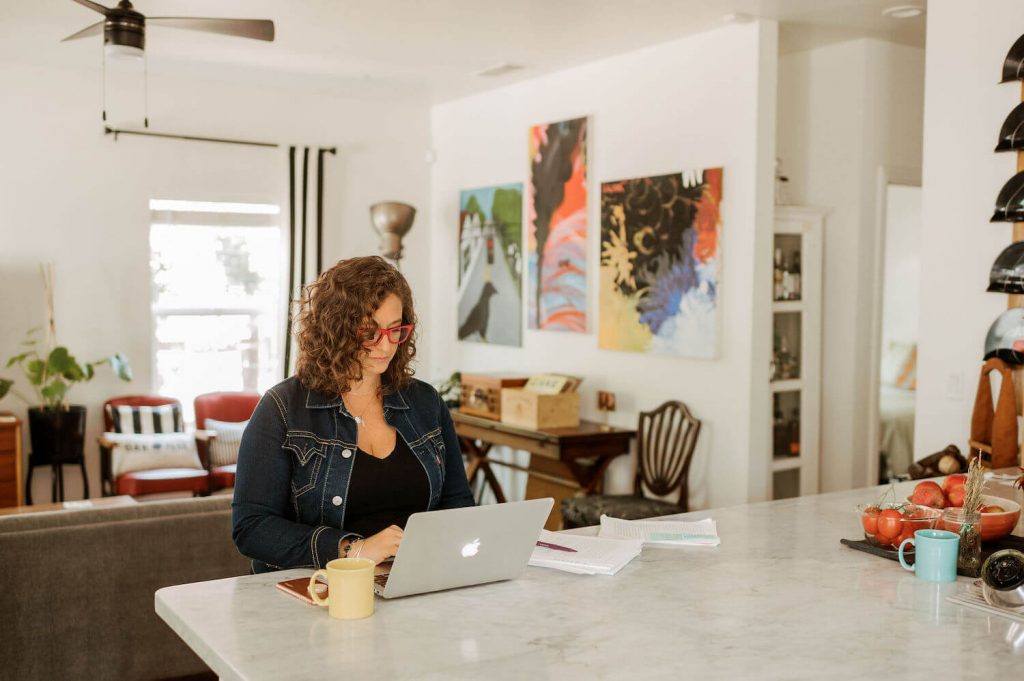I have been working with clients in our Nonfiction Bootcamp program since January of 2020. Several clients have now finished the year-long program, and towards the end of our time together, we usually talk in our bi-weekly office hours about investing in ourselves. I intentionally save this discussion for the end of the program because EVERYTHING we have been working on together all year has been a version of self-investment in one form or another. But now that we are coming to the end of the program, my goal is to set them up for success with a vision for how they can continue a sustainable practice of ongoing self-investment.
Believe me, I know it’s not easy.
How often do we come up with reasons why we CAN’T give ourselves what we need?
If you’re like me and my clients, the answer is: FREQUENTLY.
We are constantly telling ourselves that our {person} (kids, spouse, boss, parents) needs us to do {task} (help them with homework, wash their work pants, send that email, call more often). And we are also constantly telling ourselves that we do not have {resource} (time, energy, attention, money) for {investment} (writing, editing our book manuscript, revising our book, hiring an editor).
By the way, did you notice that not all investments need to be monetary?
Definitely there are times when the investment required is monetary, and it may even feel unaffordable and out of reach. But let me ask you this: what is your current reality costing you? It may not be costing you money, but remaining stuck in a place where you are unhappy, exhausted, and frustrated is costing you all of time, energy, and attention that you are spending (wasting?) not getting where you want to be.
Here’s an example.
I just started working with a new health practitioner who is a dietitian and nutritionist. I’ve made investments like this in the past, working with private, alternative health practitioners, and have seen amazing results. But it has been a while because the practitioner I had been working with passed away in 2017.
I thought I would be okay on my own with everything I learned working with my previous practitioner—if I stayed on the path she charted for me, I should be fine. But things weren’t fine. As I have been sharing in previous emails, the past three years got pretty rough for me with life circumstances. And it affected my health. My energy and fatigue have been all over the place. I have gained weight. I have been moody and irritable. I worried constantly about an MS relapse.
Meanwhile I kept trying to manage my health on my own. With the supplements regime. With the diet and food protocol. With new information and resources I discovered on my own. I did start seeing a new doctor, but did not experience the same results as I had previously. I kept trying new things, and when something seemed to work it didn’t last for long.
Nothing worked and I felt like I was getting nowhere.
Maybe you feel this way with your writing or your book project. And if you do, you know how much it sucks. You feel like you’re spinning your wheels. You feel like you’ll never feel better. You’ll never get beyond this place where you’ve been for the past three (maybe more) years.
It’s the worst, debilitating, demoralizing place to be.
I have been there many times. With my health management, and with my writing practice.
When this happens I feel determined to figure things out. I spend so much time reading, researching, looking up theories, listening to experts. I spend so much energy searching, looking, hoping to find the answer. I spend so much attention on who I should be listening to and what the so-called experts have to say.
I’m spending so much time, energy, and attention. And it’s expensive—especially when it’s getting me nowhere—because there are so many other things in my life that need my time, energy, and attention. Like my husband, my family, my friends, my business, my clients.
I knew something had to give, so after a complimentary thirty-minute consultation with my new practitioner, I signed up for her twelve-week program without even blinking at the cost. I know that she will help me evaluate everything I’m doing, make tweaks unique to my body and my lifestyle, and really listen to me so that she can provide care that is tailored to my needs instead of generalized to the symptom.

